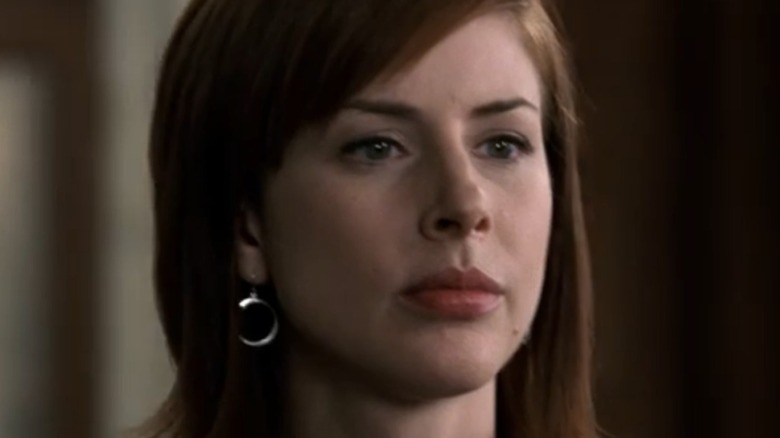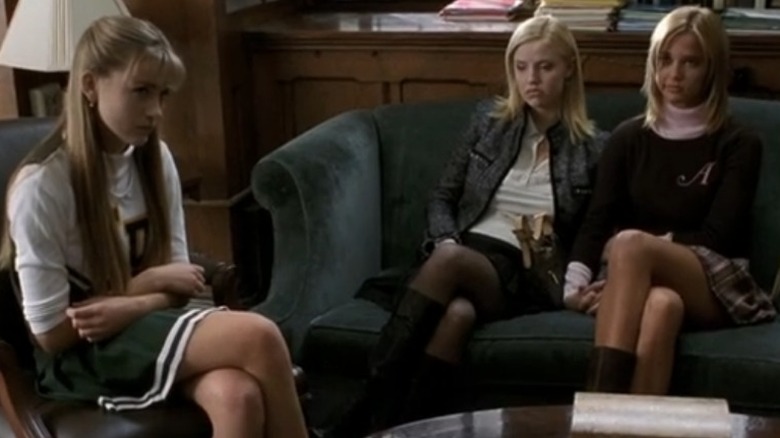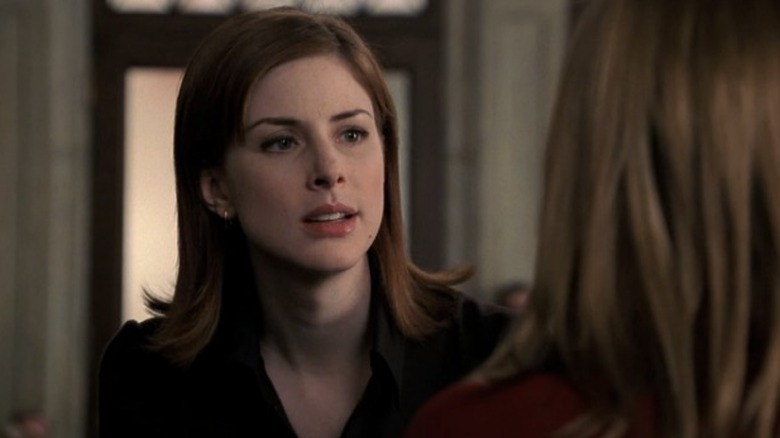The Best Courtroom Scene In Law & Order: SVU Season 5
Season 5 of "Law & Order: Special Victims Unit" contains some of the long-running series' most prescient, poignant, and relevant debates, most of which play out in the courtroom.
In Episode 7, for instance — which is titled "Choice" — we see Diane Neal's A.D.A. Casey Novak ask a family court judge to legislate what a pregnant woman (albeit one with an addiction to alcohol) can and cannot do with her body, potentially setting a precedent in conflict with a decades-old Supreme Court decision. In Episode 22 ("Painless"), Novak must once again navigate hotly controversial territory while attempting to define the line between advocating for or assisting in a patient's right to die, while Episode 24 ("Poison"), tackles the racial and class biases of judges in cases of alleged child abuse.
Season 5 is not, in other words, a particularly straightforward or "quiet" era in the series' history.
But the Season 5 courtroom scene that most stands out does so not for its examination of a real-world controversy (though its storyline is, like all "Law & Order" episodes, inspired by a true case) but because from a writing, storytelling, and acting standpoint, it strikes a pitch-perfect balance. Episode 17's classic, campy, and "Columbo"-bred use of the cross-examination "gotcha" belies a far more subtle subtext — one almost more relevant today than it was when the episode first aired in February of 2004.
Episode 17 delivers an important reminder
"Mean" debuted nearly a full two months before "Mean Girls" hit theaters, and based on the central antagonists' wardrobes, attitudes, and dyed blonde hair, you'd think it was written to serve as a much darker prequel to the film (or a less comedic sequel to 1999's "Jawbreaker"). In the episode, a seeming ingenue of a victim named Emily is revealed to have been mercilessly bullying, gaslighting, and humiliating her former friend and classmate Agnes (Lindsay Hollister). Understandably, the already-distraught Agnes becomes a suspect in the girl's murder, but she's a red herring. As it turns out, Emily's three bffs — Kelli Garner's Brittany O'Malley, Arielle Kebbel's Andrea Kent, and Rose/Kimberly McConnell's Paige Summerbee — turned on, tortured, and killed the fourth member of their clique.
As the undisputed leader of the group and the defendant most responsible for Emily's death, Brittany strikes a deal with Novak to testify against her friends and co-conspirators, and here's where things get interesting.
Though Andrea and Paige have separate attorneys, the strategy is the same: convince the jury that their underdeveloped brains, peer pressure, and a biologically-driven compulsion to conform to a group excuses or mitigates their participation in the crime. For a while, it looks as though the jury is going to fall for it, not because they actually believe the defense, but because they want to. Herein lies one of the trial's more unnerving aspects.
Novak channels Columbo in Mean
The jury doesn't want to believe that these two wide-eyed, privileged, pretty high school cheerleaders could possibly have committed such heinous acts sans some underlying psychosis. Surely, they want to think, this long-studied compulsion to conform (and social pressure is, admittedly, a very real thing, as outlined in Psychology Today) is behind it, just as it's behind the average German's allegiance to Hitler in WWII (an analogy made by the defense's expert).
If this need can be overcome, and if it isn't hard-wired in a way that explains such cruelty, it means that teenage girls are capable of monstrous acts all on their own — a pill the jurors aren't keen on swallowing. Novak, unsurprisingly, isn't having it. She gets the psychologist to admit this drive can be overcame, and she reminds the court that lack of will power isn't a defense for murder. Still, the girls do seem genuinely remorseful and pathetic, particularly Andrea.
Here's where the scene expertly shifts from uncomfortable social commentary to classic TV courtroom kitsch.
Suddenly(!), Novak realizes that Andrea's class ring has a September birthstone in it, despite her birthday being in January. She asks her to take her ring off and show it to the judge, and as soon as she does, the A.D.A. is able to rest her case. The (stolen) ring's inscription reads "Emily," a revelation that sets off some deliciously melodramatic courtroom fireworks. The scene's compelling, difficult-to-strike balance of the all-too-sobering and the tad-too-clever not only accounts for the episode's 8.7 star rating on IMDb, it allows its still-relevant indictment of our species to sink in, rather than sound off.


